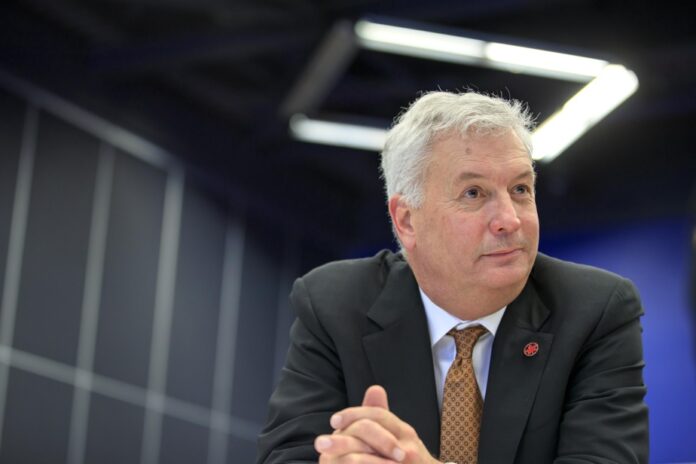To defuse the linguistic storm of fall 2021, Air Canada promised the federal government that the pay of its big boss would be influenced by his mastery of French. Michael Rousseau’s salary more than tripled last year, but it’s impossible to get an idea of his progress.
In the 100-page document that sets the table for the annual meeting of shareholders scheduled for May 12, the country’s largest airline devotes only 13 words to the commitment made by its president and chief executive about a year and a half.
“Mr. Rousseau has continued to honor his personal commitment to learning French,” reads the proxy circular recently filed with the stock exchange authorities.
But when it comes to getting an idea of how Molière’s fluency in the language influenced the manager’s overall compensation, there are few details to sink your teeth into. This is the finding of the Director General of the Institute for the Governance of Private and Public Organizations (IGOPP), François Dauphin, who analyzed Air Canada’s solicitation circular, at the request of La Presse.
Mr. Dauphin was also very critical of the salary increases granted to Air Canada’s five main executives, who saw their total pay – which takes into account base salary, bonuses and other benefits – set at 23 million last year while the operating loss amounted to 187 million.
Mr. Rousseau had sparked a lively controversy in the fall of 2021 on the sidelines of a speech delivered almost exclusively in English before the Chamber of Commerce of Metropolitan Montreal (CCMM). On the sidelines of the event, the manager admitted to having lived peacefully in Quebec, where he has been living since 2007, without mastering the official language of the province.
Based in Montreal and subject to the Official Languages Act, Air Canada had subsequently promised that the language of Molière would be part of the criteria for evaluating the performance of its big boss. The pledge was made by the chairman of the company’s board of directors, Vagn Sørensen, in a letter dated November 8, 2021 to Finance Minister Chrystia Freeland.
Mr. Sørensen agreed to a request made by Ms. Freeland. The great moneymaker of the country had been very critical of Air Canada. By challenging its chairman of the board as a shareholder, it asked that Mr. Rousseau’s fluency in French be added to “its main performance objectives”.
Ottawa holds some 21.6 million Air Canada shares in the wake of emergency loans made to the airline at the height of the COVID-19 pandemic. With a stake of about 6%, the federal government is the largest shareholder in the company.
In Mr. Dauphin’s opinion, everything related to Mr. Rousseau’s knowledge of French seems “camouflaged” in the “non-financial component” of his annual bonus. This category encompasses objectives such as “service growth, security and official languages”, among others. There are no additional details offered in the flyer.
“I hope they have more specific indicators internally,” says Dauphin. […] We do not have the monetary value of this component (the language issue) on remuneration. »
By email, Air Canada reiterated that the commitment made by Mr. Sørensen in November 2021 with Ottawa “still stands”. The company, however, did not offer further details on Mr. Rousseau’s language goals.
“Like many companies, we do not provide details of individual ratings or relying on data that is not public,” the carrier points out in its statement.
The Trudeau government has not commented on the contents of Air Canada’s circular. In an email, Adrienne Vaupshas, spokesperson for Ms. Freeland, however, indicated that Ottawa expected to see the carrier “demonstrate transparency on the progress made” by its president, “both to its shareholders and to the public. in general “.
The director of the IGOPP nevertheless notes some improvements in terms of linguistic transparency. Mr. Dauphin notes that Air Canada takes the trouble to point out that 15% of its board members – two people – are fluent in the country’s two official languages. Mr. Rousseau is not one of them, however.
Mr. Dauphin also questions the airline’s decision to resume giving bonuses to its executives despite the losses in 2022. He finds it particularly “irritating” to see Air Canada congratulating itself on the negative 8% return obtained by its shareholders while the reference group used by the company to compare itself showed a negative performance of -15%.
“As a reason for giving bonuses, it’s a bit thin,” says Mr. Dauphin. The shareholders still lost. We were quickly very generous when we emerged from the pandemic. We’re back to the level of 2019, when the stock was worth more than $50 and all was well. »
To its shareholders, Air Canada justifies wage increases with its withdrawal from the Large Employer Emergency Credit (LEEC) program. This federal aid was accompanied by a cap on the compensation of senior executives. With the exception of a loan to repay customers whose flights had been canceled by the health crisis, Air Canada ultimately did not need the loans made available to it by Ottawa.















